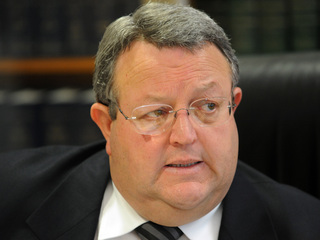The oil leak in the Gulf of Mexico should be a wake-up call to governments and energy companies, argues William Jackson, raising deep questions about our addiction to oil. Compensation may be paid for immediate damages - but what about the wider environmental harm?

Birds along the gulf coast have been among the immediate victims
The world changed one summer's day in 1858.
In a field in Pennsylvania, in the United States, the world's first specially constructed deep well struck oil.
The trickle of oil from the Earth, long extracted by humans in small amounts, became a torrent.
 |
 It is time to look again at the technology and risks involved in getting the oil our societies are addicted to It is time to look again at the technology and risks involved in getting the oil our societies are addicted to 
|
Relatively easy to find, extract, process, store and transport - and above all cheap - liquid oil quickly became our most important energy source to cook, heat, cool and transport things.
From plastics to supermarkets, and from globalised industry supply chains to the layout of our towns and cities, almost every aspect of human life has been radically altered over the past 150 years by oil.
Although cheap and plentiful oil has given many people choices and freedoms that never existed before, our addiction has been costly, measured in increased air and water pollution, rampant land use change, overharvesting of our seas, increasing greenhouse gas emissions and consequent climate change, acid rain and urban sprawl.
After 150 years, and with the Gulf of Mexico being the latest place where a major oil spill threatens nature and people in predictable and unpredictable ways, it is time to look again at the technologies and risks involved in getting the oil to which our societies are addicted.
Driving technology
The days of easy access to oil are over.
Humans are inventing ever more ingenious ways to find and extract more difficult to access oil reserves in more extreme and generally more ecologically pristine regions.
 |
 BP will pay to clean the water in the Gulf of Mexico, but cleaning the water and restoring ecosystem function is not the same thing BP will pay to clean the water in the Gulf of Mexico, but cleaning the water and restoring ecosystem function is not the same thing 
|
But getting oil from places such as the Arctic or deep under the ocean is not only technically difficult; it increases the risk of environmental damage, as we're currently seeing in the Gulf of Mexico.
Oil extraction technology has improved a great deal over recent years, driven in part by the need to get it from these more difficult places.
There have also been big improvements in operational procedures and standards, not least regarding the health and safety of oil workers.
But technology and operational procedures to minimise the risk of environmental damage, and to cope with and clean up after environmental catastrophes, do not appear to have kept pace with extraction technology.
Oil is still gushing into the Gulf of Mexico. BP is spending millions of dollars a day to contain the oil with booms, using chemicals to disperse and break it up, and burning some oil on the ocean surface.
But understanding how, for example, these toxic chemicals become distributed in the water column and how they will affect marine life, given the scale at which they are being used, is poor.
BP is deploying makeshift containment domes to channel the escaping oil from the ocean floor to the surface where it can be collected by vessels.
Considering the high environmental and societal risks and impacts, and huge cost of oil spills, shouldn't this technology be more advanced?
The waters of the Gulf of Mexico are warm, with well developed infrastructure and staging locations nearby. What would happen if a similar disaster happened in the cold, ice covered and remote waters of the Arctic?
The higher risk of getting oil from more remote places means a higher price.

Islands can be protected - but not the wider ocean's ecology
Where oil reaches the coast, it will damage ecosystems on which many people rely for livelihoods.
Chord-grass marshes are vital nursery grounds for shrimp, and habitat for numerous other species.
It has been estimated that 90% of seafood from the Gulf of Mexico is produced by the marshes of Louisiana, Mississippi and Alabama.
Hurricane Katrina showed us how much we depend on healthy natural coastal ecosystems for shoreline protection.
The bigger risk
We see pictures of damaged animals, wetlands and shorelines around the region; but the short and long term impacts on ecosystems and livelihoods will stretch well beyond Louisiana's fishing and tourist operators.
The true risks of energy choices on ecosystem services - the natural systems that support human life and livelihoods - are not being adequately factored into government policy or the balance sheets and stock prices of businesses.
BP will pay to clean the water in the Gulf of Mexico, but cleaning the water and restoring ecosystem function is not the same thing.

The discovery of oil changed the world - is the world paying the price?
|
The true costs of restoration will not be borne by BP.
They will be borne through the lost opportunities, livelihoods and culture of communities dependent upon the ecosystem services that would otherwise be generated by the gulf, by the tourists who do not get to enjoy visiting the area, and by taxpayers who end up footing the bill to bring the regional economy back into health.
There will be disruptions and losses to commercial, sport and subsistence shell and fin fisheries and mariculture, as well as to commercial shipping and recreational boating.
Mangroves, as hatcheries and filtering systems, will be affected meaning additional water treatment costs.
Hotels, restaurants and bars, rental car companies, airports, military operations, and other industrial activities will suffer, with indirect and induced regional economic effects of these losses compounding the costs.
Some losses may prove to be economically or ecologically irreversible, raising the true costs of the accident substantially.
Future proof
What would it take to reduce the likelihood of such a disaster happening again?
First and foremost, it is unlikely that the true cost of such an event was accounted for by BP, because many of the effects on ecosystem services are only indirectly influenced by market forces.
A full accounting of the value of ecosystem services from the Gulf of Mexico by either BP or its insurance companies would increase the expected cost of accidents, reduce the likelihood of risky projects being approved and increase the likelihood of adopting additional, and costly, safeguards against such accidents.
The history of energy extraction has been marked by a number of disasters that have driven change: Piper Alpha, Three Mile Island, Chernobyl, and the Exxon Valdez to name but a few.
What is happening now in the Gulf of Mexico should be a wakeup call to governments, regulatory authorities and energy companies.
It should spur them to provide safeguards, improve technology to minimise the potential of environmental disasters, adequately and rapidly deal with the environmental and social consequences when disasters occur - and re-examine and improve the way we factor cost into energy investment decisions.
Dr William Jackson is deputy director-general of the International Union for the Conservation of Nature (IUCN)
The Green Room is a series of opinion articles on environmental issues running weekly on the BBC News website










